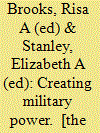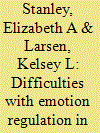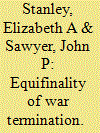|
|
|
Sort Order |
|
|
|
Items / Page
|
|
|
|
|
|
|
| Srl | Item |
| 1 |
ID:
089609


|
|
|
|
|
| Publication |
Stanford, Stanford University Press, 2007.
|
| Description |
ix, 252p.
|
| Standard Number |
9780804753999
|
|
|
|
|
|
|
|
|
|
|
|
Copies: C:1/I:0,R:0,Q:0
Circulation
| Accession# | Call# | Current Location | Status | Policy | Location |
| 054284 | 355.0332/BRO 054284 | Main | On Shelf | General | |
|
|
|
|
| 2 |
ID:
177004


|
|
|
|
|
| Summary/Abstract |
The ability to regulate negative emotions is especially necessary for service members in the contemporary U.S. armed forces, since they routinely face situations that elicit negative emotions while executing their professional roles. Yet difficulties with regulating emotions, which are associated with stress and mood disorders, suicidality, and impairments in work performance, remain prevalent across this group. This article surveys research in five domains—recruitment and selection effects, military cultural pressures and coping strategies, training, common chronic stressors, and the contemporary operational environment—to highlight structural contributors to the heavy stress loads that U.S. service members often bear, which may contribute to their difficulty with emotion regulation (ER). It concludes with several recommendations that the military could implement to mitigate service members’ stress loads and facilitate ER. Enhancing their ER skills may offer a long-term strategy to improve their resilience and performance.
|
|
|
|
|
|
|
|
|
|
|
|
|
|
|
|
| 3 |
ID:
090986


|
|
|
|
|
| Publication |
2009.
|
| Summary/Abstract |
Bargaining models of war suggest that war ends after two sides develop an overlapping bargaining space. Domestic mechanisms-domestic governing coalitions, a state's elite foreign policy decisionmaking group, and their role in ending interstate war-are critical in explaining how, when, and why that bargaining space develops. Through preference, information, and entrapment obstacles, wars can become "stuck" and require a change in expectations to produce a war-terminating bargaining space. A major source of such change is a shift in belligerents' governing coalitions. Events in the United States, China, and the Soviet Union during the Korean War illustrate the dynamics of these obstacles and the need for domestic coalition shifts in overcoming them before the conflict could be brought to an end.
|
|
|
|
|
|
|
|
|
|
|
|
|
|
|
|
| 4 |
ID:
091419


|
|
|
|
|
| Publication |
2009.
|
| Summary/Abstract |
Bargaining models of war suggest that war ends after two sides develop an overlapping bargaining space. Domestic mechanisms-domestic governing coalitions, a state's elite foreign policy decisionmaking group, and their role in ending interstate war-are critical in explaining how, when, and why that bargaining space develops. Through preference, information, and entrapment obstacles, wars can become "stuck" and require a change in expectations to produce a war-terminating bargaining space. A major source of such change is a shift in belligerents' governing coalitions. Events in the United States, China, and the Soviet Union during the Korean War illustrate the dynamics of these obstacles and the need for domestic coalition shifts in overcoming them before the conflict could be brought to an end.
|
|
|
|
|
|
|
|
|
|
|
|
|
|
|
|
| 5 |
ID:
091600


|
|
|
|
|
| Publication |
2009.
|
| Summary/Abstract |
The authors' theory contributes an alternative domestic politics pathway to traditional bargaining models of war termination. In bargaining models, the rational updating process that produces an overlapping bargaining space can develop a significant lag, which extends the war beyond a logical ending point. The authors posit that a change in the domestic governing coalition is often necessary to kick-start this updating process once it has become bogged down through preference, information, and entrapment obstacles. The authors demonstrate that domestic coalition shifts are a critical path to peace, using survival analysis techniques on Bennett and Stam's (1996) war-level data set of wars (1862-1990) and a new belligerent-level data set of wars (1945-2006). These tests show that because war policies can become institutionalized over time, there is a very strong link between coalition shifts and war termination.
|
|
|
|
|
|
|
|
|
|
|
|
|
|
|
|
|
|
|
|
|